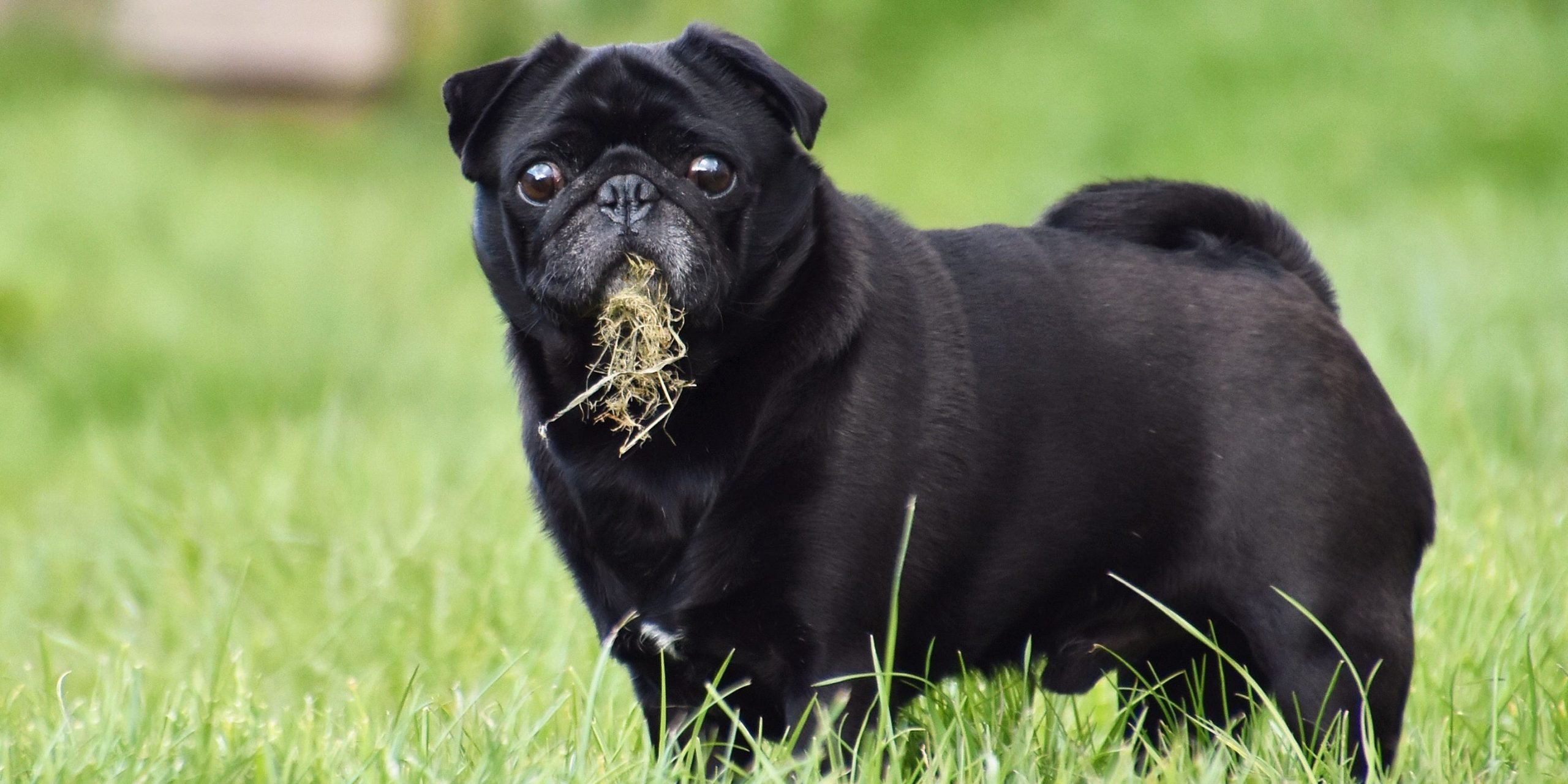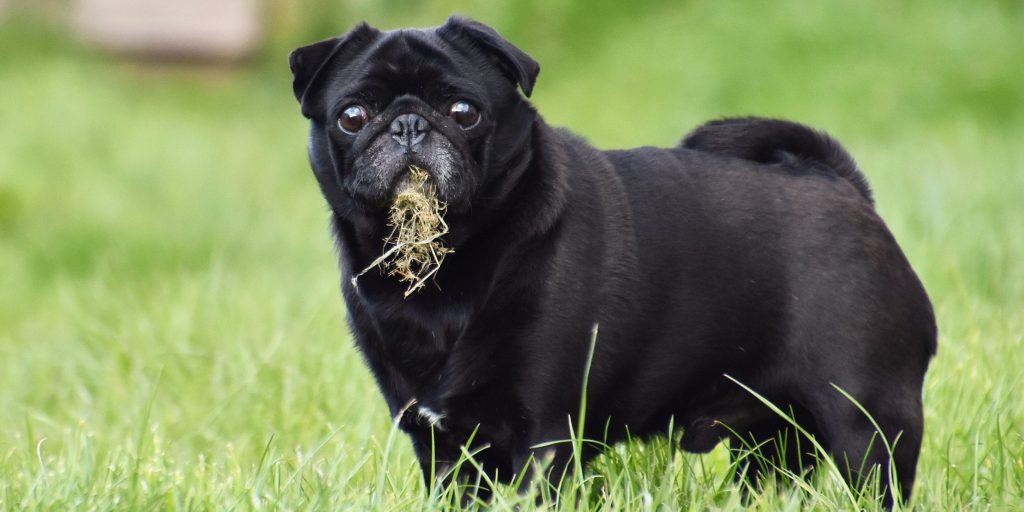
Samantha French / EyeEm / Getty Images
- Your dog might be eating grass because it provides a source of fiber in their diet.
- Dogs may also eat grass when their stomach is upset since it can make them throw up.
- Grass-eating is a habit that dogs may have inherited from wolves, so some pups just like the taste.
- Visit Insider's Health Reference library for more advice.
Nearly 80% of dogs who have access to grass will occasionally eat it.
Researchers still don't know exactly why dogs eat grass, but there are many theories, like getting rid of worms or calming their anxiety.
Here are six reasons your dog may eat grass and when you should be concerned about it.
1. They need more fiber in their diet
There's no single answer to why dogs eat grass, but some experts believe that dogs may be craving a nutritional component like fiber.
Grass may be "providing trace elements or vitamins that are missing in your dog's diet," says Jeannine Berger, DVM, Senior Vice President of Rescue and Welfare at San Francisco SPCA.
There are no studies proving that dogs with low-fiber diets eat more grass. However, there is some anecdotal evidence that dogs stop eating grass when their owners feed them a high-fiber diet, says Nicholas Dodman, BVMS, DACVB, president of the Center for Canine Behavior Studies.
If your dog isn't getting enough fiber, they may show symptoms like:
- Diarrhea
- Constipation
- Blocked anal glands, which can cause your dog to scratch their backside on carpets or leak a foul odor
- Obesity
If you see these signs along with grass-eating, talk to your vet about whether you should adjust your dog's diet.
2. Their stomach is upset
The fiber in grass may help food move more easily through your dog's gut. Because of this, "grass might also help if your dog is dealing with underlying gastrointestinal disease, like inflammatory bowel disease," Berger says.
Perhaps due to instinct, some dogs have learned that eating grass may also soothe their acid reflux, Dodman says. And this makes sense, since grass contains pectin, a type of fiber that can help treat acid reflux in humans.
"If dogs have a bad feeling in their stomach, they may eat grass to make themselves throw up and feel better," Dodman says. However, vomiting might not be the main reason dogs eat grass - a small 2008 study found that only 22% of dogs who ate grass tended to vomit afterward.
If your dog is regularly eating grass to the point of vomiting, Berger says to call your vet, as this can be a sign of underlying disease like intestinal issues, cancer, or liver disease.
Besides eating grass, other signs that your dog has an upset stomach include:
- Vomiting or diarrhea
- Licking their lips or licking the air
- Gulping
- Loss of appetite
If your dog has an upset stomach, you can also try feeding them mild foods like boneless, skinless chicken and rice. If it doesn't get better after a couple days, call your vet.
3. They're anxious
Eating grass can also be a sign that your dog is feeling anxious. "For example, a dog that is apprehensive when another dog or person approaches him may suddenly start to sniff or even eat grass," says Karen Sueda, DVM, a veterinary behavior specialist at VCA West Los Angeles Animal Hospital.
In some cases, grass-eating can be a regular anxious habit "similar to a nervous person chewing on their nails or smacking/popping the gum they are chewing on," Sueda says.
Other signs that your dog is anxious are:
- Excessive barking
- Pacing or acting restless
- Panting
- Drooling
- Acting aggressive
If you think your dog has anxiety, talk to your vet about the best treatment for them, such as specialized training.
4. They have intestinal worms
"Grass eating and diarrhea are definitely signs a dog may have 'worms'or some other GI illness," Dodman says.
Though there are no studies on dogs, some wolf studies have revealed parasites wrapped around blades of grass in scat, Berger says. This could signal that eating grass may help remove worms from the gastrointestinal tract.
You can tell if your dog has worms by looking for these symptoms along with grass-eating:
- Vomiting or diarrhea
- Weight loss
- Developing a pot belly
- Acting lethargic
- Worms in stool
"If worms are present, dewormers work well and fast, relieving diarrhea and grass-eating simultaneously," Dodman says. Your vet can test your dog for worms and prescribe deworming medication.
5. It's inherited from their ancestors
In the wild, dogs hunt various animals that eat grass, like rabbits and goats. When dogs eat an animal, they also eat the grassy content of their stomachs and get plant nutrients.
In their modern diets, dogs may not get these same nutrients and it's possible that they may seek out grass as a supplement. Eating grass may also be part of a dog's scavenging instinct to look for food.
These grass-eating behaviors may have been passed down to dogs by their wolf-like ancestors. By analyzing stool samples from wolves, researchers have discovered that up to 47% of wolves eat grass.
6. They like the way it tastes
"Some dogs may simply like the taste or texture of grass," Sueda says. You may even notice that your dog is selective about the type of grass they want to eat.
"New grass has an attractive odor to us and perhaps for dogs," Dodman says. Newly cut grass gives off a chemical called (Z)-3-hexenal, which may make grass seem appetizing to dogs, says Dodman. Dogs may also use the grassy odor to mask their natural scent, an instinct left over from their hunting days.
Dogs' tendency to chew may also play a role - there is no definitive evidence, but dogs may eat grass for the same reasons people enjoy chewing gum.
Insider's takeaway
It's normal for dogs to eat some amount of grass, but if your dog is showing unusual symptoms like diarrhea or aggression, grass-eating may be a sign of an underlying condition like intestinal worms or anxiety.
If you see a sudden change in the amount of grass your dog is eating, or "if your dog is regularly eating a large amount of grass and inducing vomiting, you should consult with your veterinarian," Berger says.
Grass eating itself is usually harmless to dogs, but you should watch out for grass that may be contaminated with chemicals like fertilizer or weed killer, Dodman says.
